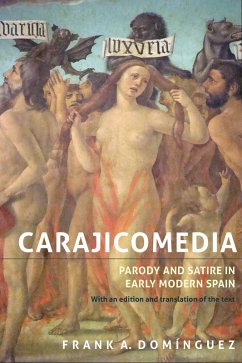A study and edition of one of the most ignored works of early Spanish literature because of its strong sexual content, this work examines the social ideology that conditioned the reactions of people to the events it describes as well as Fernando de Rojas's masterpiece, Celestina.
Since Carajicomedia was published in 1519, it has been largely ignored by critics because of its strong sexual content. The author of Carajicomedia: Parody and Satire in Early Modern Spain believes that it is a sophisticated and complex composition that provides as good a vantage point from which to examine the ideology of the period as does La Celestina.
In their poems, the writers of Carajicomedia inadvertently reveal thedeep worries of the knights and nobles who opposed the regencies of Ferdinand the Catholic and Francisco Jiménez de Cisneros pending the arrival of Charles V. Carajicomedia is therefore a harbinger of the War of the Comuneros, the great popular revolt that convulsed Spain in 1520.
In this book's chapters, the author examines the parodic relationship between the text of Juan de Mena's El Laberinto de Fortuna, the glosses of Hernán Núñez's Las Trezientas, and Carajicomedia. He then turns to its actual writers and their settings, and shows how their satirical attitudes towards males, females, and conversos reveals the failure of the societal mechanisms in place to control desire and miscegenation. Carajicomedia: Parody and Satire in Early Modern Spain concludes with a paleographic edition of the text and appendices that contain a modern Spanish version and its Englishtranslation, as well as examine Carajicomedia's language.
Frank A. Domínguez is a professor of medieval Spanish literature and culture at the University of North Carolina at Chapel Hill.
Since Carajicomedia was published in 1519, it has been largely ignored by critics because of its strong sexual content. The author of Carajicomedia: Parody and Satire in Early Modern Spain believes that it is a sophisticated and complex composition that provides as good a vantage point from which to examine the ideology of the period as does La Celestina.
In their poems, the writers of Carajicomedia inadvertently reveal thedeep worries of the knights and nobles who opposed the regencies of Ferdinand the Catholic and Francisco Jiménez de Cisneros pending the arrival of Charles V. Carajicomedia is therefore a harbinger of the War of the Comuneros, the great popular revolt that convulsed Spain in 1520.
In this book's chapters, the author examines the parodic relationship between the text of Juan de Mena's El Laberinto de Fortuna, the glosses of Hernán Núñez's Las Trezientas, and Carajicomedia. He then turns to its actual writers and their settings, and shows how their satirical attitudes towards males, females, and conversos reveals the failure of the societal mechanisms in place to control desire and miscegenation. Carajicomedia: Parody and Satire in Early Modern Spain concludes with a paleographic edition of the text and appendices that contain a modern Spanish version and its Englishtranslation, as well as examine Carajicomedia's language.
Frank A. Domínguez is a professor of medieval Spanish literature and culture at the University of North Carolina at Chapel Hill.
Dieser Download kann aus rechtlichen Gründen nur mit Rechnungsadresse in A, D ausgeliefert werden.


